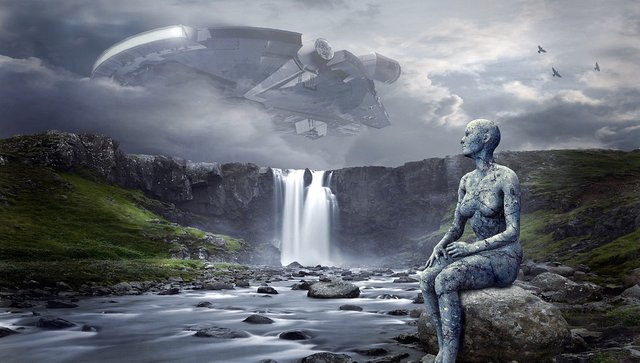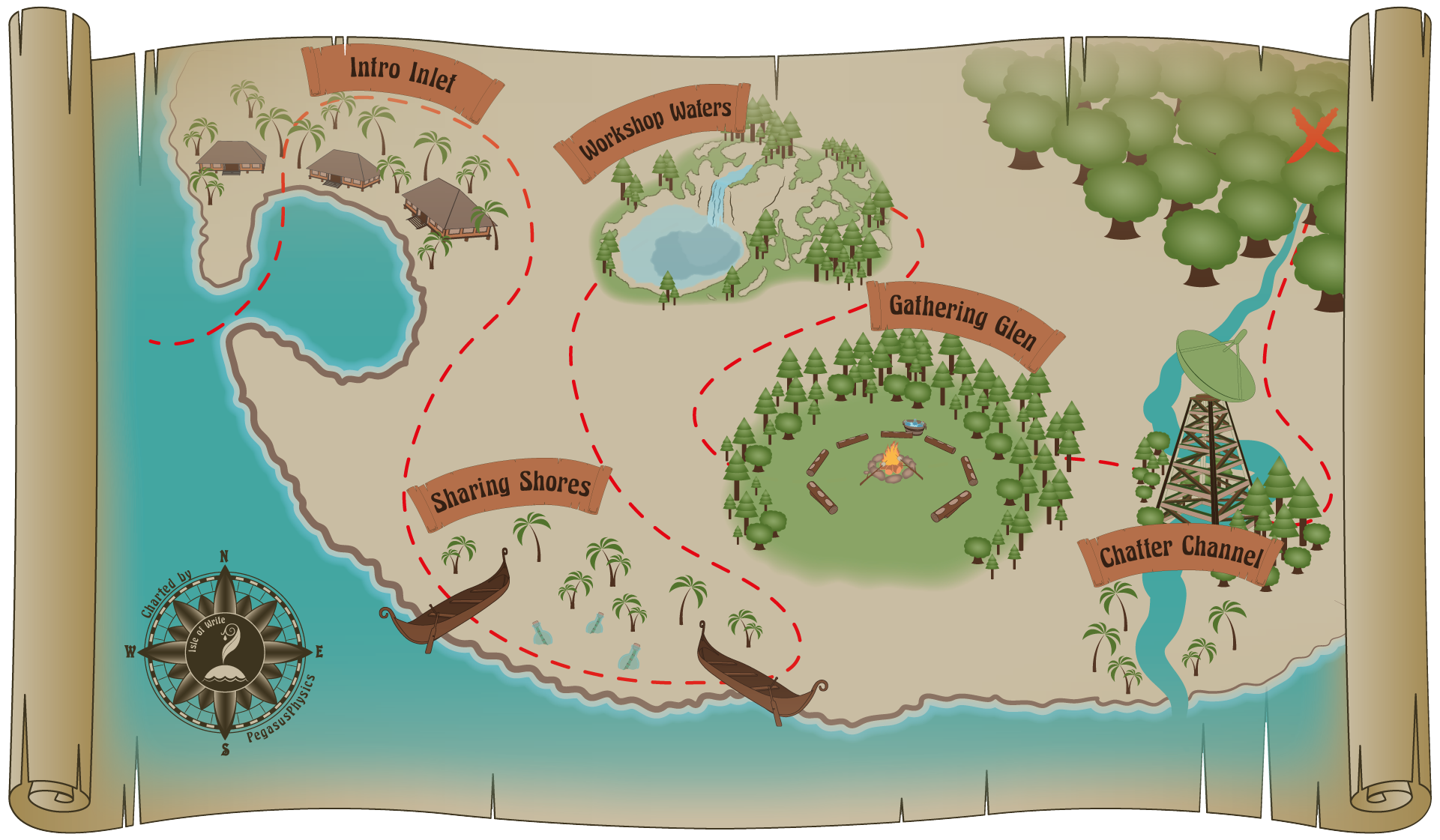Yann Rousselot, poet, lured me to the dark side with “Dawn of the Algorithm”
Poetry + Science Fiction may add up to the ultimate in geekdom, but Yann Rousselot--fresh from the poetry cafes of Paris literary salons--lured me to the dark side with “Dawn of the Algorithm.” An illustrated collection of thirty-two poems inspired by the looming robopocalypse, catastrophes and cataclysms, movies, video games, aliens, academia—and Facebook memes of the mighty T-Rex with comically short, pathetic little arms? Sold!
The full playlist of the audiobook is free to download - if you like it, share away. But click the URL https://soundcloud.com/anominou5/sets/dawn-of-the-algorithm because, sorry, formatting glitches forever plague me.

It was the pathos and irony of a depressed dinosaur that got me. It’s “the micro-apocalypses that spark when you throw together love, longing, friendship, and loss—what some might call The Dark Side of the human experience,” Rousselot sums it up in his blog.
The poems and illustrations are catchy, cute, cynical, yet hopeful, profoundly silly, and altogether human.
Rousselot, having lived the past decade in Paris, the capital of literary pretensions and academic snobbery, having studied at the Sorbonne and paid his dues pondering Greek myths, the Hindu pantheon, and “post-colonial” themes, says he found himself turning to the stuff people talk about outside of academia. What if a “heartache poem narrated by a giant robot was equally legitimate as a lyrical meditation on the first blossom of spring?” he asks. “Why is Kurt Vonnegut literature, when Philip K. Dick is science fiction?”
If we could “sift the oceans with a coffee filter, wring the mountains like a wet cloth,” the way Rousselot does in the poem “A Darkly Iridescent Carapace,” we might find the answer: “everybody knows something is down there between the schist and diamonds.”
I’m hard pressed to explain it to my daughters (who inexplicably dislike all forms of science fiction), but this really speaks to me:
Everyone is so, so ready for this;
We’re gonna make this galaxy our bitch.
The poems speak to me, and they speak for me. Gamers, geeks, misfits and those who inadvertently harm others will find a deft, light touch, and some reassurance in “The Lament of Kid Kaiju”:
I own a giant robot. This should be enough
To make friends in this universe.
Destroyer of cities, crusher of skulls—
This should be enough to convince people
I am a worthy opponent.
I run after cute girls with my mecha robot
Pounding mountain ranges into valleys,
... I lift my tanker-sized feet gingerly
To see if there are any survivors
Maybe it’s not a good sign that I identify so much with that poem, but read the whole thing and tell me you see what I mean. (I won’t tell your kids. Honest.)
The poem that really caught my eye came on the heels of Tam Linsey’s apocalyptic tale of a vegan activist who loses her fight against GMO corporations and is forced to eat meat (“Amarantox”). In “Fresh Content” the poet confesses:
I’ve never really killed anything
But this steak is whispering.
My knife screams
Running across the porcelain.
I’d totally hunt another human being.
“Poetry is considered high literature, almost by definition, but I always wanted my poetry to pop, to be accessible, steeped in the cultural references that you see in the media,” Rousselot blogs. “The Purist” does not own a smartphone, but the man whose steak is whispering uses Instagram. Schwarzenegger’s flexed muscles and Russell Crowe’s gladiator headgear are mentioned in “Headmovies,” with lines like these sandwiched in between:
When the cyborgs take over
I will be the first to mate with one
and I know it will be a jagged and metallic experience
but I will suffer through it,
I will gladly birth a new super-race of Aryan robots
with narcissistic personality disorders
and high political aspirations.
I love the way Rousselot expands the “classics” to include icons of science fiction, especially “Welcome to the Doctor Moreau Zoo.” I also like the way math, keyboard symbols, and modern communications can be transformed into a poem like “distress signal: the adventures of comsat icarus nine,” a broadcast by the Command & Control AI of Communications Satellite Icarus Nine:
[3]
My distress signal =
Urine in a violin.
My distress > can take.
An Emily Dickinson sort of penchant for hyphens characterizes “Ugly Bags of Mostly Water”:
in the gas giant i call home there are no capitals—
no territory—frontiers—there are no names at all—
that which you call skin—
A threadbare term to describe where I stop and others begin—
Writing is a solitary act, but it also has a social dimension, which Rousselot discovered at open mics and workshops. Community, he says, is a source of inspiration and energy; “It changed everything about my approach to art.”
“Dawn of the Algorithm” is a great addition to the canon of “genre poetry,” which really deserves a better reputation.
You all missed the 99-cent sale, but it's still for sale online:

NOTE: I wrote this review for Perihelion Science Fiction in 2015, but it is no longer available online. I'd like to make it accessible to readers again, especially now that I'm called upon to read poetry in one of the channels at Isle of Write.
Come join us!
*images courtesy of pixabay - zorro4 (Paris porcelain) and Stefan Keller aka kellepics





What if a “heartache poem narrated by a giant robot was equally legitimate as a lyrical meditation on the first blossom of spring?” he asks.
This is exactly the type of question I ask myself... "What if a poem about inflation written by a medieval Irish faery was as legitimate as the love sonnets taught in schools?" This book sounds awesome Carol and I love the title. Will be looking for this for my kindle.
I love this so much. All of this. And these lines here: "that which you call skin—
A threadbare term to describe where I stop and others begin—" these might as well have been penned by a Slav versed on all the classics :-)
Brilliant intro to a person I now must read more of. Thank you @carolkean
Just like @geke, I too ponder upon such questions. I put it down to insanity - maybe it is - but then I trust in @geke's intelligence, so I am breathing a sigh of relief.
I have wanted to know this one too. As I am sure PKD also wondered. Is there a secret club that decides such things?
The publications sounds fascinating. I hadn't considered the blending of poetry and scifi, and the degree of wit that it incorporates makes for great reading.
This was a fascinating review of something I never knew existed and am now extremely interested to investigate further.
That's why you are the master of reviews, I guess!
Oh, and anyone who doesn't think Philip K. Dick is literature either doesn't know literature or doesn't understand Dick. ;)
I'm too late to resteem this poem, so I'll tuck it in here:
@blakejames
https://steemit.com/poetry/@blakejames/poetry-for-pleasure-4
Love that graphic!